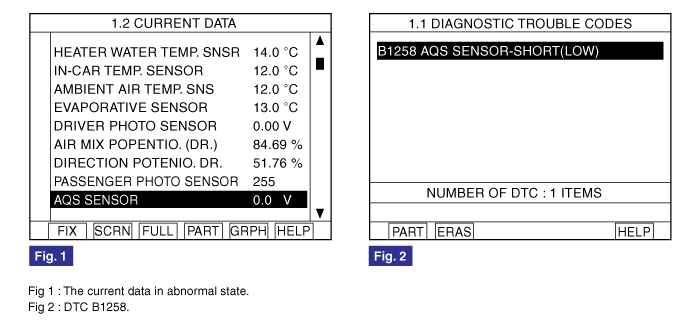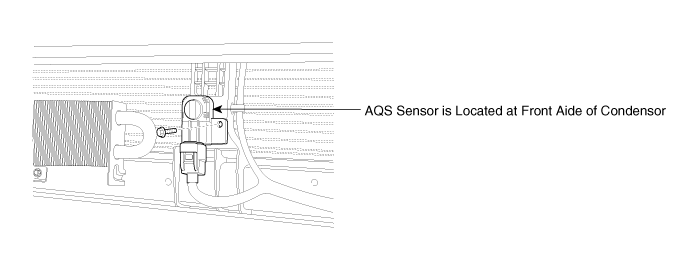Monitor the "AQS sensor" Parameter on the Scantool. While making hazardous gas such as tobacco fumes around the AQS sensor.


AQS(Air Quality System) keeps air inside in the most suitable state for driver. In polluted area AQS detects hazardous gas and intercepts inflow automatically, Inversely, In freshsh area it allows the inflow of air to prevent the shortage of air and the accumulation of carbon dioxide. AQS sensor is located at front side of condensor and once hazardous gas is detected, it delivers the voltage signal to A/C controller for closing intake door.
The A/C controller sets DTC B1258 if there is a short circuit in AQS sensor signal harness or the measured voltage value of the sensor is less than the threshold value.
Item | Detecting Condition | Possible cause |
DTC Strategy | ● Voltage check | ● Short circuit in harness ● Faulty AQS Sensor ● Fault A/C Control Unit |
Threshold value | ● < 0.1V | |
Detecting time | ● 1 sec | |
FAIL SAFE | ● AQS function OFF ● Intake door : return to previous state |
※ Voltage value of AQS sensor as a function of position of operating condition.
Operating condition | Voltage | Note |
Right after IGN "ON" | 2.5V ± 0.3V | preheating(35 ± 2sec) |
Normal | 4.3V ± 0.3V | Intake door : Fresh |
Gas detected | 0.9V ± 0.3V | Intake door : Recirculation |
Connect scantool to Data Link Connector(DLC).
Engine "ON"
Monitor the "AQS sensor" Parameter on the Scantool. While making hazardous gas such as tobacco fumes around the AQS sensor.

Are the DTC B1258 present and is parameter of "AQS SENSOR" fixed?

Go to "Inspection" procedure.

Fault is intermittent caused by poor contact in the sensor's and/or A/C control unit's connector or was repaired and A/C control unit memory was not cleared. Thoroughly check connectors for looseness, poor connection, bending, corrosion, contamination, deterioration, or damage. Repair or replace as necessary and then go to "Verification of Vehicle Repair" procedure.
Many malfunctions in the electrical system are caused by poor harness and terminals.
Faults can also be caused by interference from other electrical systems, and mechanical or chemical damage.
Thoroughly check connectors for looseness, poor connection, bending, corrosion, contamination, deterioration, or damage.
Has a problem been found?

Repair as necessary and go to "Verification of Vehicle Repair" procedure.

Go to "Signal circuit inspection" procedure.
Check for open in harness.
Ignition "OFF"
Disconnect AQS sensor.
Measure resistance between terminal "4" of AQS sensor and terminal chassis ground.
Specification : Approx. 0 Ω

Is the measured resistance within specifications?

Go to "Component inspection" procedure.

Check for open in harness. Repair as necessary and go to "Verification of Vehicle Repair" procedure.
Check AQS sensor.
Engine "ON"
Connect AQS sensor.
Measure voltage between terminal "4" and "5" of AQS sensor.
Specification : Refer the specifications.

Operating condition | Voltage | Note |
Right after IGN "ON" | 2.5V ± 0.3V | preheating(35 ± 2sec) |
Normal | 4.3V ± 0.3V | Intake door : Fresh |
Gas detected | 0.9V ± 0.3V | Intake door : Recirculation |
Specifications : Voltage value of AQS sensor as a function of position of operating condition.
Is the measured voltage within specifications?

Check connectors for looseness, poor connection, bending, corrosion, contamination, deterioration, or damage. Repair or replace as necessary and then go to "Verification of Vehicle Repair" procedure.

Substitute with a AQS sensor and check for proper operation.
If the problem is corrected, replace AQS sensor and then go to "Verification of Vehicle Repair" procedure.
Check A/C Control Unit
Engine : "ON"
Disconnect AQS sensor.
Measure voltage between terminal "2" of A/C Control Unit and chassis ground.
Specification :Approx. 5V

Is the measured voltage within specifications?

Check connectors for looseness, poor connection, bending, corrosion, contamination, deterioration, or damage. Repair or replace as necessary and then go to "Verification of Vehicle Repair" procedure.

Substitute with a known-good A/C Control Unit and check for proper operation.
If the problem is correcirculationted, replace A/C Control Unit and then go to "Verification of Vehicle Repair" procedure.
After a repair, it is essential to verify that the fault has been corrected.
Connect scantool and select "Diagnostic Trouble Codes(DTCs)" mode and then clear DTC.
Operate the vehicle and monitor the DTC on the scantool.
Are any DTCs present?

Go to the applicable troubleshooting procedure.

System is performing to specification at this time.